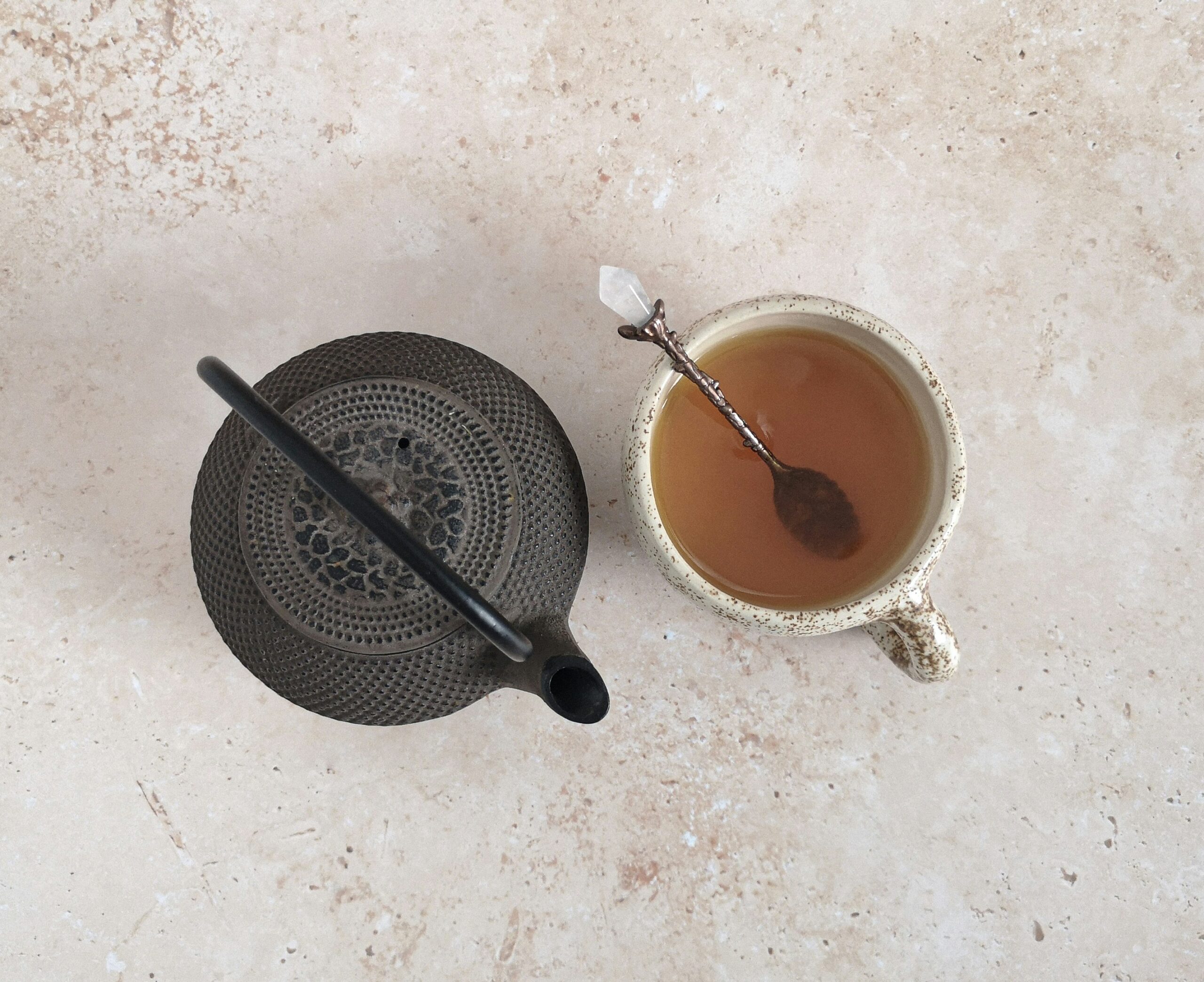

Feeling worn out and in need of a natural energy boost? Herbal teas might be just what you need to revitalise your day. Ginger root tea is excellent for improving circulation and boosting your energy levels. Its invigorating properties can help you feel more alert and ready to tackle your tasks.
Green tea is another stellar option, known for its ability to increase energy expenditure and enhance thermal energy. This popular herbal tea provides a gentle caffeine kick that can sustain your energy levels throughout the day. Additionally, its antioxidant properties contribute to overall wellness, making it a healthier choice compared to sugary energy drinks.
For those looking for variety, exploring unique herbal tea blends can lead you to discover new favourites that not only boost energy but also offer a range of health benefits. Whether it’s a mint infusion or a spicy chai, each cup can be tailored to your taste and specific energy needs.
Key Takeaways
- Herbal teas like ginger root and green tea boost energy naturally.
- Green tea enhances energy expenditure and provides antioxidants.
- Experimenting with different tea blends can offer additional health benefits.
SO WHAT ARE WE TALKING ABOUT TODAY?
- The Role of Caffeine in Energy Teas
- Exploring Herbal Teas for Sustainable Energy
- Specific Varieties of Energy-Boosting Teas
- Health Benefits Beyond Energy
- Enhancing Mental Performance with Tea
- Understanding Tea and Physical Wellbeing
- Cultivating a Healthy Tea-Drinking Routine
- Preparing the Perfect Cup for Maximal Energy
- Discovering Unique Blends and Flavours
- The Safe Use of Stimulating Teas
The Role of Caffeine in Energy Teas
Caffeine is a natural stimulant found in many energy teas. It helps increase alertness and provides an energy boost. This section explores how caffeine in tea compares to coffee and its effects on energy and alertness.
Comparing Caffeine Levels: Tea vs Coffee
Tea and coffee both contain caffeine, but their levels vary. A typical cup of coffee contains about 95 mg of caffeine, whereas a cup of tea has between 20-60 mg depending on the type. Green tea and black tea are common energy teas, with black tea having slightly more caffeine than green tea.
Comparative Caffeine Content:
| Drink | Caffeine (mg per cup) |
|---|---|
| Coffee | 95 |
| Black Tea | 40-60 |
| Green Tea | 20-45 |
Coffee provides a stronger caffeine punch, which might be too intense for some. Tea offers a milder caffeine boost, making it a suitable option for those who want to avoid jitters.
Effects of Caffeine on Energy and Alertness
Caffeine works by blocking adenosine, a neurotransmitter responsible for making you feel tired. This leads to increased alertness and a sense of being more awake. Tea’s caffeine content provides a sustained energy boost without the sudden crash often experienced with coffee.
Tea also has L-theanine, an amino acid that promotes relaxation without drowsiness. The combination of L-theanine and caffeine in tea results in a balanced energy boost. This can help you stay focused and alert throughout the day without the overstimulation that coffee can cause.
In summary, while coffee offers a higher caffeine content, tea’s balanced mix of caffeine and L-theanine provides a smoother, more sustained energy boost.
Exploring Herbal Teas for Sustainable Energy
Herbal teas can provide a natural and sustainable energy boost without the crash often experienced with caffeine. This section will look into the benefits of caffeine-free options, herbs known for boosting energy, and the traditional use of ginseng tea.
Benefits of Caffeine-Free Options
Choosing caffeine-free herbal teas can be a great way to gain energy without the jitters. Caffeine can sometimes lead to increased anxiety and disrupted sleep patterns. Herbal teas like rooibos and peppermint offer a natural energy lift without these side effects.
Chamomile and lavender are also good options. While they are known for their calming effects, they help reduce stress, which can leave you feeling more energised overall. These teas support relaxation, improving your sleep quality and sustaining energy levels throughout the day.
Switching to caffeine-free herbal teas can be especially beneficial for those sensitive to caffeine or looking to cut down on their overall caffeine intake. This choice helps maintain a balanced energy flow.
Herbs Known for an Energy Boost
Several herbs are famed for their energy-boosting properties. One notable herb is yerba mate, which offers a smooth and steady increase in energy. It contains theobromine, known for providing gentle stimulation.
Ashwagandha is another herb worth considering. Known for its adaptogenic properties, it helps the body manage stress, leading to higher and more consistent energy levels. This herb is often used in traditional Ayurvedic medicine.
Peppermint tea is also excellent for enhancing alertness and focus. The menthol in peppermint can provide a refreshing boost, helping you stay awake and alert. Incorporating these herbs into your routine can provide a significant energy uplift.
Ginseng Tea: Traditional Energy Enhancer
Ginseng tea has been used for centuries as a natural energy enhancer. The herb is known for its ability to combat fatigue and increase endurance. Ginseng works by reducing oxidative stress in the body, leading to more sustained energy.
Asian and American ginseng are the most common types. Both offer similar benefits, although they vary slightly in their active compounds. Drinking ginseng tea can also support cognitive function, helping you stay sharp and focused.
Ginseng tea is also lauded for its immune-boosting properties. By supporting the immune system, it helps maintain your overall well-being, contributing to consistent energy levels. This makes ginseng tea an excellent choice for those seeking a natural way to stay energised.
RELATED: Herbal Remedies For Bruising: Effective Natural Solutions
RELATED: Herbs For Nightmares: Natural Remedies For Peaceful Sleep
Specific Varieties of Energy-Boosting Teas
When looking for teas that provide an energy boost, it’s important to consider the specific herbs and ingredients that offer these benefits. Here, we focus on three popular types of energy-boosting teas that cater to different tastes and needs.
Green Tea: The Gentle Stimulant
Green tea is renowned for its mild energy boost. It contains caffeine but in lower amounts than coffee, making it less likely to cause jitters. It also includes an amino acid called L-theanine, which may help in maintaining focus and calmness.
Key benefits of green tea:
- Contains antioxidants.
- May aid in weight loss.
- Less caffeine compared to coffee.
- Improves brain function due to L-theanine.
Green tea is ideal for those who need a gentle lift without a crash.
Black Tea: Robust and Revitalising
Black tea offers a stronger energy boost than green tea. It contains higher levels of caffeine, making it a good alternative for those who enjoy a robust flavour and need a more substantial pick-me-up.
Key benefits of black tea:
- High in antioxidants.
- May improve heart health.
- Boosts alertness due to higher caffeine content.
Black tea is perfect for people who prefer a stronger taste and need a more noticeable increase in energy.
Yerba Mate: South American Wonder
Yerba mate is gaining popularity outside of South America due to its unique blend of benefits. It contains a balance of caffeine, antioxidants, and nutrients, which can provide a steady and powerful energy boost without the negative side effects of coffee.
Key benefits of yerba mate:
- Rich in antioxidants and nutrients.
- Provides steady energy.
- Less likely to cause jitters than coffee.
Yerba mate is excellent for those who want a sustained energy boost with additional health benefits.
Incorporating these teas into your daily routine can offer a natural and varied way to increase your energy levels.
Health Benefits Beyond Energy
Drinking herbal tea goes beyond just providing an energising boost. It can offer a range of health benefits, particularly for your heart and mood.
#1 Antioxidants and Heart Health
Herbal teas are rich in antioxidants, which help to protect your heart. Antioxidants reduce oxidative stress. This is important because oxidative stress can lead to heart disease.
Drinking herbal tea can also help lower blood pressure. Consistently high blood pressure is a major risk factor for heart problems. Teas like hibiscus are known for their blood pressure-lowering properties. In fact, hibiscus tea has compounds that relax blood vessels.
Herbal teas also contain anti-inflammatory properties. Chronic inflammation is linked to various heart diseases. By reducing inflammation, you are giving your heart a better chance to stay healthy. Herbal teas like green tea and rooibos are excellent choices.
#2 Herbal Teas and Mood Balance
Herbal teas can also help balance your mood. For instance, chamomile tea is famous for reducing stress. Chamomile affects stress hormones like cortisol, helping you feel more relaxed.
Peppermint tea is another great option. It can help relieve tension and may even reduce feelings of anxiety. The menthol in peppermint has calming effects.
Lavender tea is effective for promoting better sleep. Good sleep is crucial for mood regulation. Poor sleep can lead to irritability and even depression.
Herbal teas don’t just offer a pleasant taste. They provide multiple benefits to your physical and mental well-being.
Enhancing Mental Performance with Tea
Drinking herbal tea can boost your mental performance by improving focus, concentration, and cognitive function. Natural compounds in tea, such as amino acids, play a vital role in brain function and memory.
Focus and Cognitive Function
Drinking tea can significantly enhance focus and cognitive function. Green tea, in particular, contains the unique amino acid L-theanine, which is known for its calming effects. This compound helps increase alpha brain waves, associated with a relaxed yet alert mental state.
L-theanine combined with caffeine, also found in tea, improves attention and vigilance. Studies suggest this combination can lead to better performance on tasks requiring sustained attention and working memory. Matcha, a high-quality green tea, is especially rich in these compounds and provides a more prolonged and steady energy boost compared to coffee.
Other teas like ginseng and ginkgo biloba also support cognitive function. Ginseng has been found to improve mental energy and clarity, while ginkgo biloba enhances blood flow to the brain, supporting cognitive processes and memory retention.
Natural Amino Acids for Brain Function
Tea contains several amino acids that are beneficial for brain function. Besides L-theanine, teas are rich in tyrosine, which helps produce neurotransmitters like dopamine and norepinephrine. These chemicals are essential for mood regulation, focus, and overall mental alertness.
L-theanine and tyrosine work synergistically to enhance cognitive and brain functions, including learning and memory. Regular consumption of tea can help maintain these benefits over time.
Green and black teas are particularly noted for their high amino acid content. Ensuring your tea is of good quality, like high-grade green teas, ensures you get the maximum benefit from these amino acids, thereby supporting your brain health and mental performance.
Understanding Tea and Physical Wellbeing
Tea has numerous benefits for physical wellbeing, particularly in boosting metabolism and aiding digestion. These benefits help reduce inflammation and support weight loss.
Influence on Metabolism and Weight Loss
Tea, especially green and black varieties, is known to enhance metabolism. The caffeine and catechins found in tea can increase energy expenditure and fat oxidation. Studies show that consuming green tea may help in weight loss and fat reduction. For those looking to manage their weight, the thermogenic properties of tea can promote fat burning and help you feel more energetic.
Replacing energy drinks with tea can lower your calorie intake. Energy drinks often contain added sugars and artificial ingredients, whereas tea is a natural and healthier alternative. Increased metabolism from tea can help combat fatigue and improve physical performance.
Supporting Digestion and Reducing Inflammation
Herbal teas, such as peppermint and ginger, are known for their digestive benefits. Peppermint tea can relax the digestive tract, reducing symptoms of bloating and gas. Ginger tea helps stimulate digestion and can relieve nausea. These teas can improve your overall digestive health.
Teas like turmeric and chamomile have anti-inflammatory properties. Turmeric tea contains curcumin, which can help reduce inflammation and pain. Chamomile tea is soothing and can also contribute to reducing inflammation in the body. These teas are beneficial for those dealing with chronic inflammation or digestive discomfort.
Drinking herbal teas regularly can support your digestive system and reduce inflammation, leading to improved physical wellbeing.
Cultivating a Healthy Tea-Drinking Routine
Building a tea-drinking routine can help boost your energy and overall wellness. Focus on integrating tea into your day to maintain natural energy levels and avoid crashes.
Incorporating Tea into Your Daily Life
Start your day with a cup of herbal tea to awaken your senses and provide a gentle energy boost. Consider teas like ginseng and peppermint, which can enhance mental clarity and natural energy without caffeine.
Create a routine by setting specific times for tea breaks. Morning tea can help you start the day with focus, while an afternoon cup can rejuvenate you. Commit to these times to build a habit.
To increase wellness, pair your tea with healthy snacks like nuts or fruits. This balance will support lasting energy and keep you from feeling sluggish.
Avoiding the Afternoon Crash
In the afternoon, choose herbal teas that offer sustained energy. Green tea is a popular option due to its moderate caffeine content and high antioxidant levels. These elements help maintain alertness and balance.
Be mindful of the types of tea and their effects. While some teas can stimulate energy, others may be calming. Avoid teas with too much caffeine late in the day to prevent disrupting your sleep cycle.
Incorporate practices like mindful drinking to enhance the experience. Focus on the aroma, taste, and warmth of your tea. This can make your break more refreshing and reduce the likelihood of an afternoon crash.
By following these tips, you can cultivate a routine that enhances your natural energy and supports overall well-being.
Preparing the Perfect Cup for Maximal Energy
To make an energising herbal tea, focus on water quality and steeping techniques. These elements are critical to enhance the flavour, aroma, and energising properties of your beverage.
The Importance of Water Quality
High-quality water is crucial for making a great cup of tea. Poor water can affect the taste and energising properties of your tea. Use fresh, filtered water to avoid any contaminants that can alter the flavour.
The mineral content in water can also influence the extraction of beneficial compounds. Soft water is generally recommended for a smoother taste. Hard water might make the tea taste bitter due to its higher mineral content.
Boil the water to the proper temperature. For herbal teas, it’s usually best to boil the water to 100°C. This helps extract the maximum amount of polyphenols and other active ingredients that contribute to the tea’s energising effects.
Steeping Techniques for Optimal Extraction
Steeping time and method significantly impact the strength and effectiveness of your herbal tea. Use the right amount of tea leaves; typically, one teaspoon per cup is a good starting point.
Cover the tea while steeping to trap the essential oils and aromas within the beverage. This enhances the flavour and makes the tea more enjoyable.
Steep for the right duration. For most herbal teas, a steeping time of 5-7 minutes is recommended. Longer steeping can result in a stronger flavour but could also increase bitterness.
Consider techniques like decoction for tougher herbs, which involves boiling the herbs for a more extended period. This method is effective for extracting maximal energy-boosting compounds.
Proper steeping can make a significant difference in the energising effects of your tea, making it a powerful and refreshing drink.
Discovering Unique Blends and Flavours
Herbal teas for energy often feature a mix of herbs and spices, each bringing its own unique taste and benefits. Floral and earthy notes make these blends enjoyable and effective.
Finding the Right Mix of Herbs and Spices
Creating the best herbal tea for energy starts with selecting the right herbs and spices. Herbs like ginseng and yerba mate are widely known for their energising properties. Ginseng provides a steady, long-lasting energy boost, while yerba mate offers a more immediate pick-me-up.
Spices such as ginger and cinnamon not only add flavour but also bring their own benefits. Ginger can help with digestion and circulation, which further aids in maintaining energy levels throughout the day. Cinnamon, with its sweet and warming taste, can help stabilise blood sugar, preventing energy drops.
Combining these elements requires careful balancing. Too much spice can overpower the herbs, while too many herbs can make the tea taste medicinal. Experiment with different ratios to find the perfect blend for your taste and energy needs.
Exploring Floral and Earthy Notes
Floral and earthy notes can make your herbal tea not only energising but also delightful to drink. Flowers like hibiscus and chamomile provide a mild and soothing flavour that pairs well with more robust herbs.
Hibiscus, with its tart and slightly sweet taste, adds a refreshing quality. It’s also rich in antioxidants, which can help combat fatigue. Chamomile, on the other hand, offers a gentle, calming aroma that can balance out the more stimulating herbs in your blend.
Earthy tones come from ingredients like rooibos and nettle leaf. Rooibos delivers a rich, nutty flavour, and is caffeine-free, making it ideal for those sensitive to caffeine. Nettle leaf provides a slightly grassy taste and is packed with minerals, supporting overall energy and health.
By blending these floral and earthy notes, you can create a tea that is not only energising but also pleasant to drink. Experiment with different combinations to find the ones that make you feel both energised and refreshed.
The Safe Use of Stimulating Teas
Stimulating teas can provide a boost in energy and alertness, but it’s important to know how to use them safely to avoid negative effects such as jitters or poor sleep. Here’s how you can navigate the potential side effects and when it might be best to choose caffeine-free options.
Navigating Potential Side Effects
Many stimulating teas, like green tea and black tea, contain caffeine. While caffeine can improve alertness, too much can lead to jitters or increased heart rate.
Some people might experience indigestion or stress after consuming too much caffeine. It’s best to start with small amounts, especially if you’re not used to caffeine, and see how your body reacts.
For those with sensitive stomachs, teas such as ginger tea or peppermint tea may be gentler options. If you have pre-existing heart conditions, consult with a healthcare professional before adding stimulating teas to your diet.
When to Choose Caffeine-Free Options
While caffeine can help boost energy, it can also interfere with sleep. If you find yourself having trouble sleeping, even after moderate consumption, you might want to switch to caffeine-free teas.
Herbal teas such as rosemary or chamomile offer more calming effects. These can be a good choice in the evening or for those who are sensitive to caffeine’s stimulating properties.
Additionally, caffeine-free options are better for managing daily stress without the risk of side effects like jitters. They can be a soothing alternative that still offers some benefits, such as improved digestion and relaxation.
Selecting the right tea based on your needs and health considerations ensures you can enjoy the benefits without negative side effects.



Comments +